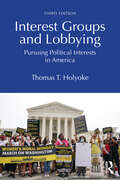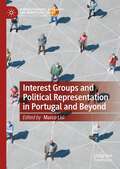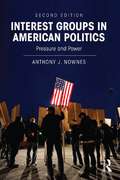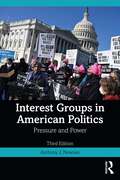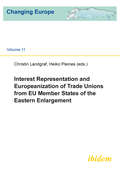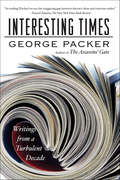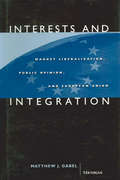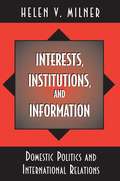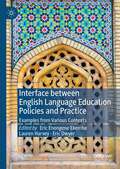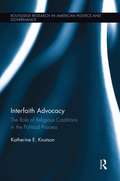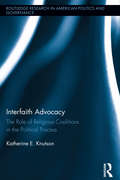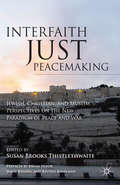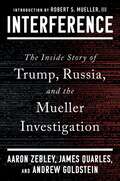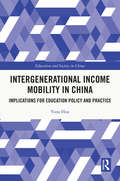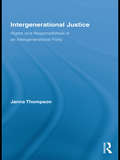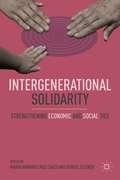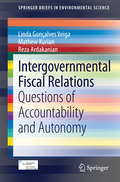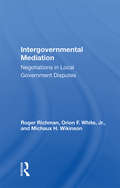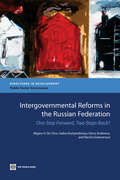- Table View
- List View
Interest Groups and Lobbying: Pursuing Political Interests in America
by Thomas T. HolyokeInterest Groups and Lobbying shows how political organizations and their lobbyists play a crucial role in how policy is made in the United States. It cuts through the myths and misconceptions about interest groups and lobbyists with an accessible and comprehensive text supported by real-world examples and the latest research.New to the Third Edition Further updates and expands the discussion of social media and other online activity engaged in by interest groups, showing that they have become more sophisticated in their use of the internet – especially social media – for keeping current members informed and for their advocacy work. New case studies on more recent advocacy efforts. Updated data used in the book, including: Data on the ideological distribution of Washington interest groups Total number and types of interest groups lobbying in the 50 states Data on campaign contributions Data on amicus briefs and case sponsorship New discussion on the ethical and public interest obligations of lobbyists.
Interest Groups and Political Representation in Portugal and Beyond (Interest Groups, Advocacy and Democracy Series)
by Marco LisiThis book examines the characteristics and evolution of interest groups in Portugal. Drawing from a wide array of sources - including surveys, parliamentary activities, media coverage and interviews with MPs and lobbyists – it systematically assesses interest group politics. The book analyses the main features of group population, the strategies utilised by organised interests, their interactions with key decision-makers, and citizens’ opinions regarding their role in the political system. The original data provided in this book frames the Portuguese case in a broader European context, and will be extremely useful for international comparisons. It will appeal to scholars and students of European politics, interest groups, democratic theories, and public policy.
Interest Groups in American Politics: Pressure and Power
by Anthony J. NownesAmericans rail against so-called special interests but at the same time many members of society are themselves represented in one form or another by organized groups trying to affect the policymaking progress. This concise but thorough text demonstrates that interest groups are involved in the political system at all levels of government – federal, state, and local – and in all aspects of political activity, from election campaigns to agenda setting to lawmaking to policy implementation. Rather than an anomaly or distortion of the political system, it is a normal and healthy function of a pluralist society and democratic governance. Nonetheless, Nownes warns of the dangers of unwatched interest group activity, especially in the realms of the electoral process and issue advocacy. Interest Groups in American Politics, Second Edition, is grounded by the role of information in interest group activity, a theme that runs through the entire book. This much anticipated revision of Nownes’s text retains a student friendly tone and thoroughly updates the references to interest group research, as well as adds a new chapter on the connections between interest groups and political parties. Numerous figures and tables throughout the book help students visualize important trends and information.
Interest Groups in American Politics: Pressure and Power
by Anthony J. NownesAmericans regularly rail against so-called “special interests.” Yet, many members of society are themselves represented in one form or another by organized groups trying to affect government decisions. Interest Groups in American Politics, Third Edition, is grounded by the role of information in interest group activity, a theme that runs through the book. This concise, thorough text demonstrates that interest groups are involved in the political system at all levels of government—federal, state, and local—and in all aspects of political activity, from election campaigns to agenda setting to lawmaking and policy implementation. Rather than an anomaly or distortion of the political system, interest group activity is a normal and healthy function of a pluralist society and democratic governance. Nonetheless, Nownes warns of the dangers of unwatched interest group activity, especially in the realms of the electoral process and issue advocacy. This much-anticipated third edition of Nownes’s text retains a student-friendly tone. It thoroughly updates the references to interest group research, social media activity, new foreign actors in American politics, and political action committee (PAC) and party connections. Numerous figures and tables throughout the book help students visualize significant trends and information. New to the Third Edition A new section in Chapter 1 (Interest Groups in the United States) on social movements in the US. A new section in Chapter 4 (The Non-Lobbying Activities of Interest Groups) on how interest groups use social media to recruit members and burnish their image. A new section in Chapter 5 (Direct Lobbying) about lobbying regulation, how it affects group behavior, and "shadow interests." New data in Chapter 6 (Electoral Lobbying) on how and how much groups spend on PACs, super PACs, and other vehicles for election spending. A new section in Chapter 7 (Indirect Lobbying) on how interest groups use social media and new technology to affect political outcomes. A new section in Chapter 8 (Interest Groups and Political Parties) on interest groups, the Republican Party, and President Donald Trump. New information in Chapter 9 (The Influence of Interest Groups) on the latest research on interest group power and influence. The new section will cite the latest literature on the growing power of business.
Interest Rate Elasticity of Residential Housing Prices
by Martin Čihák Plamen Iossifov Amar ShanghaviA report from the International Monetary Fund.
Interest Representation and Europeanization of Trade Unions from EU Member States of the Eastern Enlargement
by Christin Landgraf Heiko PleinesThis book examines the integration of major trade unions from the six biggest countries of EU's Eastern enlargement into EU governance structures. Based on extensive empirical research, including more than 150 in-depth interviews, comprehensive data, document research, and eight detailed case studies, the contributions describe the activities and perceptions of the trade unions under investigation and the different levels of engagement, including European umbrella organizations, interregional cooperation, and European Works Councils. The book thus contributes to political science research on interest representation and Europeanization as well as sociological research on labor relations.
Interest Representation and Europeanization of Trade Unions from EU Member States of the Eastern Enlargement (Changing Europe #11)
by Christin Landgraf Heiko PleinesThis book examines the integration of trade unions from the six biggest countries of the EU's Eastern enlargement of EU governance structures. Based on more than 150 in-depth interviews, comprehensive data, document research, and eight detailed case studies, contributions describe the activities and perceptions of the trade unions under investigation and different levels of engagement, including European umbrella organizations, interregional cooperation, and European Works Councils. The book contributes to political science research on interest representation and Europeanization, as well as sociological research on labor relations.
Interesting Times: Writings from a Turbulent Decade
by George PackerThe 2013 National Book Award WinnerA New York Times BestsellerThroughout his career as a journalist, George Packer has always been attuned to the voices and stories of individuals caught up in the big ideas and events of contemporary history. Interesting Times unites brilliant investigative pieces such as "Betrayed," about Iraqi interpreters, with personal essays and detailed narratives of travels through war zones and failed states. Spanning a decade that includes the September 11, 2001 attacks and the election of Barack Obama, Packer brings insight and passion to his accounts of the war on terror, Iraq, political writers, and the 2008 election. Across these varied subjects a few key themes recur: the temptations and dangers of idealism; the moral complexities of war and politics; the American capacity for self-blinding and self-renewal.Whether exploring American policies in the wake of September 11, tracking a used T-shirt from New York to Uganda, or describing the ambivalent response in Appalachia to Obama, these essays hold a mirror up to our own troubled times and showcase Packer's unmistakable perspective, which is at once both wide-angled and humane.
Interests and Integration: Market Liberalization, Public Opinion, and European Union
by Matthew J. GabelIntegration in Europe has been a slow incremental process focusing largely on economic matters. Policy makers have tried to develop greater support for the European Union by such steps as creating pan-European political institutions. Yet significant opposition remains to policies such as the creation of a single currency. What explains continued support for the European Union as well as opposition among some to the loss of national control on some questions? Has the incremental process of integration and the development of institutions and symbols of a united Europe transformed public attitudes towards the European Union? In this book, Matthew Gabel probes the attitudes of the citizens of Europe toward the European Union. He argues that differences in attitudes toward integration are grounded in the different perceptions of how economic integration will affect individuals' economic welfare and how perceptions of economic welfare effect political attitudes. Basing his argument on Easton's idea that where affective support for institutions is low, citizens will base their support for institutions on their utilitarian appraisal of how well the institutions work for them, Gabel contends that in the European Union, citizens' appraisal of the impact of the Union on their individual welfare is crucial because their affective support is quite low. This book will be of interest to scholars studying European integration as well as scholars interested in the impact of public opinion on economic policymaking.
Interests, Institutions, and Information: Domestic Politics and International Relations
by Helen V. MilnerIncreasingly scholars of international relations are rallying around the idea that "domestic politics matters." Few, however, have articulated precisely how or why it matters. In this significant book, Helen Milner lays out the first fully developed theory of domestic politics, showing exactly how domestic politics affects international outcomes. In developing this rational-choice theory, Milner argues that any explanation that treats states as unitary actors is ultimately misleading. She describes all states as polyarchic, where decision-making power is shared between two or more actors (such as a legislature and an executive). Milner constructs a new model based on two-level game theory, reflecting the political activity at both the domestic and international levels. She illustrates this model by taking up the critical question of cooperation among nations. Milner examines the central factors that influence the strategic game of domestic politics. She shows that it is the outcome of this internal game--not fears of other countries' relative gains or the likelihood of cheating--that ultimately shapes how the international game is played out and therefore the extent of cooperative endeavors. The interaction of the domestic actors' preferences, given their political institutions and levels of information, defines when international cooperation is possible and what its terms will be. Several test cases examine how this argument explains the phases of a cooperative attempt: the initiation, the negotiations at the international level, and the eventual domestic ratification. The book reaches the surprising conclusion that theorists--neo-Institutionalists and Realists alike--have overestimated the likelihood of cooperation among states.
Interface
by Stephen BuryA near-future thriller in which a shadowy coalition bent on controlling the world economy attempts to manipulate the president of the United States through the use of a computer bio-chip implanted in his brain.
Interface between English Language Education Policies and Practice: Examples from Various Contexts
by Eric Enongene Ekembe Lauren Harvey Eric DwyerThis book is about the policy-practice praxis in English language education, and draws on research from a diverse range of under-explored international settings to showcase the importance of contextual realities on how policy and practice interact. The case studies covered in the volume come from five continents (Africa, Europe, Asia, and South and North America) and cover 11 countries in total. The authors cover a wide range of themes and identify a number of issues at the interface between policy and practice. In some cases they also highlight local initiatives for navigating these issues, providing contextually-grounded guidance and experience which will be of use to teachers and teacher trainers in other settings. This book will be of interest to policy makers, EMI researchers, ELT practitioners, teacher trainers and trainees, and the broader Applied Linguistics research community.
Interfaith Advocacy: The Role of Religious Coalitions in the Political Process
by Katherine E. KnutsonUsing the historic Minnesota state government shutdown of 2011 as a backdrop, Interfaith Advocacy describes the work of the Joint Religious Legislative Coalition, an interfaith advocacy group that brings together leaders from Catholic, Protestant, Jewish, and Muslim traditions to advocate on behalf of a range of policies. As the nation's first statewide interfaith lobbying group, the story of the JRLC facilitates an examination of the role of political advocacy groups in state level American politics: what they are, how and why they form, how they mobilize citizens to participate in the political process, how they work to influence government, and what their impact is on American democracy. With research based on two years of in-depth interviews, participant observation, and analysis of archival records, this volume offers proof that it is possible to build successful long term political coalitions among improbable allies. The book investigates both the strengths and weaknesses of this model of advocacy and concludes that the presence of religious advocacy groups in the political process offers substantial benefits of representation, concern for underrepresented issues and groups, and the development of networks of social capital. Interfaith Advocacy is grounded in the theoretical literature of political science but also accessible to all readers who have an interest in political advocacy, state politics, or religion and politics.
Interfaith Advocacy: The Role of Religious Coalitions in the Political Process (Routledge Research in American Politics and Governance)
by Katherine E. KnutsonUsing the historic Minnesota state government shutdown of 2011 as a backdrop, Interfaith Advocacy describes the work of the Joint Religious Legislative Coalition, an interfaith advocacy group that brings together leaders from Catholic, Protestant, Jewish, and Muslim traditions to advocate on behalf of a range of policies. As the nation’s first statewide interfaith lobbying group, the story of the JRLC facilitates an examination of the role of political advocacy groups in state level American politics: what they are, how and why they form, how they mobilize citizens to participate in the political process, how they work to influence government, and what their impact is on American democracy. With research based on two years of in-depth interviews, participant observation, and analysis of archival records, this volume offers proof that it is possible to build successful long term political coalitions among improbable allies. The book investigates both the strengths and weaknesses of this model of advocacy and concludes that the presence of religious advocacy groups in the political process offers substantial benefits of representation, concern for underrepresented issues and groups, and the development of networks of social capital. Interfaith Advocacy is grounded in the theoretical literature of political science but also accessible to all readers who have an interest in political advocacy, state politics, or religion and politics.
Interfaith Just Peacemaking: Jewish, Christian, and Muslim Perspectives on the New Paradigm of Peace and War
by Susan Brooks ThistlethwaiteInterfaith Just Peacemaking is a collected work by 27 Jewish, Muslim and Christian scholars and religious leaders on the ten 'practice norms' of the peacemaking paradigm called 'Just Peace. 'Just Peace theory, like the paradigm it most resembles, Just War theory, is a list of specific practices that are applied to concrete contexts.
Interference
by Kay HoneymanKate Hamilton, a Congressman’s daughter in Washington D.C., is getting what she wants by “interfering.” But Kate encounters some difficulties when her family moves to West Texas and her dad can run in a special election. None of her matchmaking efforts go according to plan. Her father’s campaign gets off to a rough start. And whenever Kate messes up, the handsome and irritatingly right Hunter Price is there to witness it. But Kate has determination and a good heart, and with all her political savvy--and a little clever interference--she’ll figure out what it takes to make Red Dirt home.
Interference (Arthur A Levine Novel Bks.)
by Kay HoneymanFriday Night Lights meets Jane Austen's Emma in this wonderful novel about a big election, big games, the big state of Texas, and a little romance.As a Congressman's daughter in Washington, D.C., Kate Hamilton is good at getting what she wants -- what some people might call "interfering." But when her family moves to West Texas so her dad can run in a special election, Kate encounters some difficulties that test all her political skills. None of her matchmaking efforts go according to plan. Her father's campaign gets off to a rough start. A pro tip for moving to Texas: Don't slam the star quarterback's hand in a door. And whenever Kate messes up, the irritatingly right (and handsome) Hunter Price is there to witness it. But Kate has determination and a good heart, and with all her political savvy -- and a little clever interference -- she'll figure out what it takes to make Red Dirt home. Terrifically funny and sweetly romantic, with whip-crack dialogue and a wise perspective on growing up, Interference is the perfect next read for fans of Jenny Han, Huntley Fitzpatrick, Elizabeth Eulberg, or Sarah Dessen.
Interference: The Inside Story of Trump, Russia, and the Mueller Investigation
by Andrew Goldstein Aaron Zebley James QuarlesThe behind-the-scenes story of the investigation that shook America to its core—the Mueller investigation that presented the evidence of Russian interference in the 2016 presidential election—as told by Robert Mueller&’s closest colleagues, including never-before-revealed details into how the team investigated Putin&’s campaign to favor candidate Donald Trump and Trump&’s efforts to interfere in the investigation. Interference is the true history of the most important and consequential decisions, obstacles, and quandaries Mueller and his team faced when investigating Russian interference in the 2016 presidential election. For the first time, Mueller&’s only deputy, his most senior counselor who served on the Watergate Special Prosecution Force, and the lead prosecutor looking into obstruction of justice and Russian interference, have come together to tell a highly relevant and readable account of what it was like to carry out their investigation of election interference, as well as any connections that existed between the Russians and members of the Trump campaign. Interference also highlights the many actions Russia took as it favored candidate Donald Trump over Hillary Clinton offering a powerful reminder of how committed Russia was to determine the outcome of the election. Ultimately, the special counsel brought indictments against thirty-four individuals and entities, including Trump&’s campaign chairman; his deputy campaign chairman; a campaign advisor; his first national security advisor; and one of Trump&’s longtime associates; as well as against Russian participants. Nearly every case that was able to proceed resulted in a guilty verdict or plea. Interference explains the motivations and actions of Russia (which has not stopped exploiting America&’s weaknesses), the importance and the limitations of a special counsel, and the need for people to make principled decisions even when being pushed from all directions not to. Much can be learned from the experiences faced by the Mueller special counsel office as it broke ground on some of the most complicated challenges facing our country—then and now. The narrative carries special relevance today, as the Supreme Court has sharply limited the conduct by a president that can be prosecuted—or even investigated.
Interfirm Networks in the Japanese Electronics Industry (The University of Sheffield/Routledge Japanese Studies Series)
by Ralph PaprzyckiInterfirm Networks in the Japanese Electronics Industry analyses changes in production networks in the Japanese electronics industry. Japan's post-war success in the assembly industries is frequently attributed to innovative approaches to the organization of production: Japanese assemblers have tended to forge intricate networks of long-term interfirm business relationships. Traditionally, these networks have been characterized by hierarchical interfirm relationships resembling a pyramid. Paprzycki argues that as a result of global industry dynamics, such monolithic 'pyramidal' production networks have come under mounting pressure and are giving way to an increasing diversity of network arrangements. A major contributing factor is the growing cost and complexity of technology, which forces even the largest manufacturers to look beyond traditional network boundaries in order to gain access to complementary (technological) assets and capabilities.
Intergenerational Income Mobility in China: Implications for Education Policy and Practice (Education and Society in China)
by Yuna HouIntergenerational income mobility is of great societal importance due to its relevance to equal socio-economic opportunity and future economic efficiency. In her book Dr Hou explores the potential role of education policy in reducing intergenerational transmission of poverty and promoting intergenerational income mobility in China. Her research investigates the extent to which intergenerational income persists in China, the mechanisms behind intergenerational inequality, and premises for policy intervention. The interaction between families, labour markets, and public policies that structure a child’s opportunities and determine the extent to which income is related to family background are discussed in detail. The book comprises of three separate empirical studies examining the relationship between parents’ income and the long-term welfare of their children for two birth cohorts; the role education plays in the intergenerational income relationship; and possible policy intervention channels to facilitate intergenerational income mobility. The lessons learnt from the empirical studies in this book offer the basis for a discussion of current educational policies and provide guidance for developing more appropriate public policies to promote intergenerational income mobility in China in the future. This book contributes to the international discussion by providing evidence in Chinese context, and also provides guidance for policymakers attempting to develop more appropriate public policies to promote intergenerational income mobility in China.
Intergenerational Justice: Rights and Responsibilities in an Intergenerational Polity (Routledge Studies in Contemporary Philosophy)
by Janna ThompsonIn this timely study, Thompson presents a theory of intergenerational justice that gives citizens duties to past and future generations, showing why people can make legitimate demands of their successors and explaining what relationships between contemporary generations count as fair. What connects these various responsibilities and entitlements is a view about individual interests that both argues that individuals are motivated by intergenerational concerns, and that a polity that appropriately recognizes these interests must support and accept intergenerational responsibilities. The book ranges over the philosophical, ethical, political and environmental questions raised by intergenerational issues: how we can have duties to non-existent people, whether we can wrong the dead or be held responsible for what they did, what sacrifices we should make for our successors, and whether we have duties to people of the remote future. Encompassing the ethical problems created by demographic change, the ethical issues of population control and intergenerational implications of new technologies for creating people, this book will be of interest to those studying philosophy, politics, legal theory, and environmental studies.
Intergenerational Solidarity
by María Amparo Cruz-Saco Sergei ZelenevThis volume analyzes intergenerational solidarity from diverse interdisciplinary angles within the social sciences. It provides analytical tools to advance research and documents how societies are adjusting to major changes that affect the core of the social fabric.
Intergovernmental Fiscal Relations
by Mathew Kurian Reza Ardakanian Linda Gonçalves VeigaThis book examines and analyzes issues related to public finance in subnational governments, along with a discussion of case studies on decentralization. Most of the analysis applies to all public goods and services provided by subnational governments, with some placed on the role of subnational governments in the management of environmental resources, notably water and waste Coverage includes optimal arrangements for sharing fiscal responsibilities among different levels of government, the potential impact of decentralization on the quality of public goods delivery, local governments' expenditure and revenue choices, and the effect of decentralization on accountability, governance and policy outcomes. The scope of discussion extends to both public finance theory and applied policy debates. The first chapter, on trends in financing of public services, opens with an explanation of the how and why of government intervention in the economy, the nature and purposes of transfers between and among governments and trends in decentralization. Case studies examine the impact of decentralization in such areas as service delivery, water and sanitation, education and health, and on poverty and income inequality. Chapter 2 examines public budgets: governance structures, norms and organizational practices, building up understanding of budgets, budget cycles, fiscal revenues from fees and taxes, expenses, debt and political economy issues, rules mandating balanced budgets in government and more. Chapter 3 discusses issues of accountability and policy outcomes, offering important lessons from recent international experience, including ways to strengthen political, administrative and financial accountability. The concluding chapter recounts lessons from recent international experience and surveys implications for the nexus approach to management of environmental resources. The information, analysis and expert advice presented here is particularly relevant for developing and emerging countries, where well designed decentralization reforms have a higher potential to improve efficiency in the provision of public services, and to enhance the development of integrated and sustainable strategies for the use of water, soil and waste resources and applications that advance the nexus approach.
Intergovernmental Mediation: Negotiations In Local Government Disputes
by Roger RichmanDisputes between government bodies are usually settled through either political bargaining or litigation, but a third method has been successfully utilized in Virginia. Since 1980, a number of municipal annexation disputes have been settled using formal mediation as a tool. The authors draw on their experiences in mediation and local government to
Intergovernmental Reforms in the Russian Federation: One Step Forward, Two Steps Back?
by Migara O. De Silva Natalia Golovanova Elena Andreeva Galina KurlyandskayaThis study is a comprehensive review of fiscal federalism in the Russian Federation. It presents a strong case for greater decentralization. By succinctly surveying the literature on fiscal decentralization and clearly spelling out the main concepts, the volume sets the stage for the subsequent description of the fiscal system in Russia and its evolution through a succession of reforms guided by a desire on the part of Russian policymakers to craft a workable system of fiscal federalism. The authors not only describe the state of fiscal federalism in Russia at its key turning points, but they also provide insightful critical assessments of the reforms introduced at each stage. The book is rich with examples, which makes it an easy and exciting reading. The book's analysis of the history gives perspective to the authors' assessment of the current state of Russia's federalism. The authors make a strong case for greater decentralization in Russia based not only on the traditional economic benefits of fiscal federalism but also on the political benefits from local government competition. The richness of detail and the careful tracing of the reforms over the past nearly two decades also mean that this study will be an invaluable guide to both current observers with academic and policy interest in the recent fiscal federalism reforms as well as Russia's fiscal evolution since the early 1990s and its current fiscal challenges.
